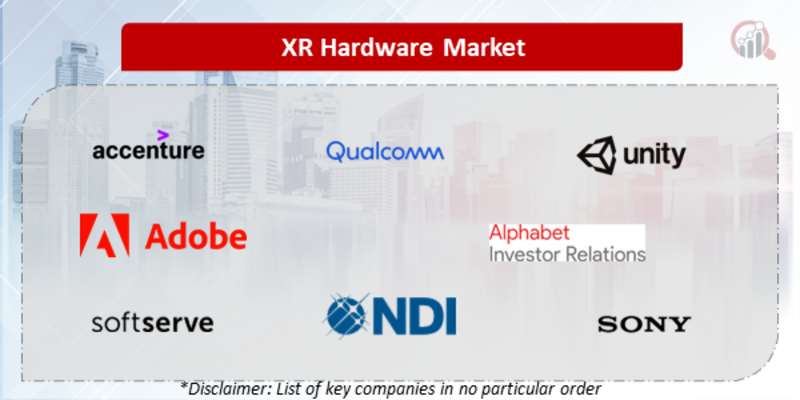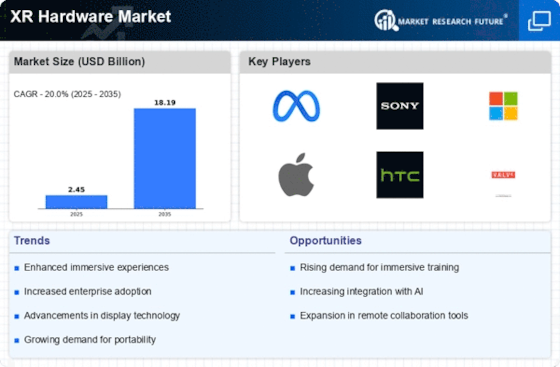Top Industry Leaders in the XR Hardware Market

The Competitive Landscape of the XR Hardware Market
From augmented reality (AR) overlaying our world to virtual reality (VR) transporting us to digital realms, the Extended Reality (XR) hardware market is painting a vibrant picture of the future. This dynamic hums with the competitive rhythm of innovators vying for control of the canvas. Understanding their strategies, the factors influencing market share, and the overall competitive scenario is crucial for navigating this immersive terrain.
Key Players:
- Accenture plc
- Qualcomm Incorporated
- Unity Technologies
- Adobe Inc.
- Alphabet Inc.
- SoftServe Inc.
- Northern Digital Inc.
- Sony Corporation
- Facebook Inc.
- Microsoft Corporation
- Tata Elxsi
- Semcon
- HTC Corporation
Strategies Adopted by Leaders:
- Technological Prowess: Meta (formerly Facebook) leads the charge with VR headsets like Quest 2, offering high-resolution displays, intuitive hand tracking, and a robust content library, catering to diverse consumer and enterprise applications.
- Vertical Specialization: Sony Interactive Entertainment focuses on high-end VR experiences with PlayStation VR 2, targeting gamers with advanced haptics, eye tracking, and exclusive game titles.
- Ecosystem Play: Apple and Microsoft leverage their strong ecosystems with devices like AR glasses in development, aiming to seamlessly integrate XR into user experiences across hardware, software, and services.
- Focus on User Experience and Accessibility: Implementing comfortable designs, intuitive interfaces, and accessibility features like corrective lenses opens doors to wider user demographics and fosters market adoption.
- Embrace of Open-Source Initiatives and Interoperability: Promoting standardized software platforms and device communication protocols facilitates content creation and application development across disparate XR hardware, benefitting the entire industry.
Factors for Market Share Analysis:
- Immersion and User Experience: Companies offering VR headsets with high-resolution displays, realistic sound, intuitive input methods, and seamless tracking command premium prices and secure market share by delivering captivating and comfortable experiences.
- Cost Competitiveness and Affordability: Balancing advanced functionalities with an attractive price point is crucial for capturing market share, particularly in price-sensitive consumer segments and emerging markets.
- Content Availability and Ecosystem: A robust library of compelling apps, games, and experiences across diverse genres attracts users and strengthens market share for compatible hardware platforms.
- Enterprise Applications and Integration: Developing XR solutions for specific industries like healthcare, education, and engineering expands market reach and secures partnerships with large organizations.
- Focus on Privacy and Security: Addressing user concerns about data privacy and security in immersive environments builds trust and fosters wider adoption of XR technologies.
New and Emerging Companies:
- Startups like Magic Leap and Nreal: These innovators focus on developing next-generation AR glasses with lightweight designs, advanced field-of-view displays, and hands-free interactions, aiming to revolutionize accessibility and user experience.
- Academia and Research Labs: Stanford University's Virtual Human Interaction Lab and MIT's Media Lab explore disruptive technologies like brain-computer interfaces and haptic feedback suits, shaping the future of human-computer interaction in XR environments.
- Software and Content Developers: Companies like Unity and Unreal Engine create powerful game engines and development tools, enabling the creation of immersive content that fuels the entire XR hardware market.
Industry Developments:
Accenture plc:
- January 18, 2024: Announced a partnership with Meta to develop and implement XR solutions for enterprise training and collaboration.
- June 2023: Launched the "Extended Reality (XR) Innovation Center" to co-create and experiment with XR solutions for clients across various industries.
Qualcomm Incorporated:
- January 17, 2024: Unveiled the new Snapdragon XR2 Gen 2 platform, offering enhanced processing power and graphics capabilities for next-generation XR devices.
- November 2023: Collaborated with leading VR headset manufacturers to integrate their XR chipsets for improved performance and battery life.
Unity Technologies:
- January 16, 2024: Released an update to their Unity Engine specifically optimized for XR development, including VR and AR functionalities.
- September 2023: Acquired Weta Digital, a visual effects company known for their work on The Lord of the Rings films, to boost their XR content creation capabilities.









